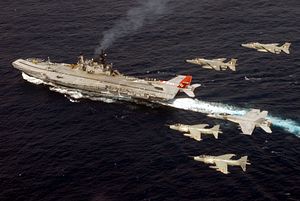A few mid-week links covering defense, security, and geopolitics in the Asia-Pacific:
Farewell to India’s INS Viraat. India’s oldest aircraft carrier INS Viraat will be decommissioned in 2016 and turned into a docked museum ship after 57 years of continuous service, first as the Royal Navy’s HMS Hermes and then, after entering the Indian Navy in 1987, as the Viraat. The Viraat was the flagship of the Indian Navy until its successor the INS Vikramaditya was commissioned two years ago. The Viraat‘s decommissioning will primarily mark a symbolic moment for the Indian Navy—its contribution to India’s Naval aviation was modest with a limited group of British Aerospace Sea Harrier jets and indigenously designed utility helicopters. Earlier this year, The Hindu noted that the carrier’s decommissioning was spurred by the deteriorating condition of the aging Harrier jets.
Anxiety along the Russia-China border. If you don’t look closely, you may think that Russia and China are two pegs in an ironclad alliance and, while there are good reasons to think that they’ll stay aligned for a while, there are difficulties and anxieties underlying the relations, particularly on the Russian side. As a recent Financial Times report highlights, local politicians in the government of Russia’s Zabaikalsky Krai, a poor area in southern Siberia, on the Chinese border, recently concluded a controversial deal to let a private Chinese firm effectively control and develop 1,000 square kilometers of Russian land over a 49-year lease.
The deal sparked chest-thumping among Russian nationalist politicians, one of whom noted that the “deal poses huge political risks, particularly to Russia’s territorial integrity.” The FT notes that similar rhetoric has been “widely echoed.” The strategic ramifications of this anxiety will be limited, but the episode is revealing of a Russian nationalist streak that senses a threat emanating from China. Putin and Xi will continue to stand shoulder-to-shoulder, especially given the dip in Russia’s relations with the West, but longer term, these forces could cause a moment of reckoning on Sino-Russian ties.
India’s approach to diplomacy. India’s former National Security Adviser Shivshankar Menon speaks candidly with the National Bureau of Asian Research on a variety of topics concerning Indian foreign policy, including India’s relations with the United States, China, and security outlook. Menon discusses the motivating factors behind India’s increasingly vocal approach on the South China Sea, burgeoning defense relationship with the United States, and interest in trilateralism with the United States and Japan.
A Chinese nationalism push as World War II anniversary looms. If you missed it, reports earlier this week stressed that China will mark the 70th anniversary of the end of the Second World War in Asia with a profusion of nationalism. According to Reuters, Beijing is sanctioning a “stream of movies, concerts, performances and exhibitions,” all to emphasize the valor of Chinese soldiers and citizens during what China calls the “Chinese People’s War of Resistance Against Japanese Aggression.” War commemorations kicked off on Tuesday with a graphic display, showing photographic evidence of Japanese atrocities in China during the war.

































